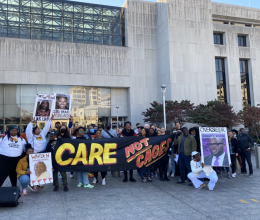On March 6, 2025, President Trump signed an Executive Order called “Addressing Risks from Perkins Coie LLP.” Perkins Coie is a major national law firm, headquartered in Seattle. The President declared that Perkins Coie engaged in “dishonest and dangerous activity,” had “manufactured” evidence in connection with the Clinton 2016 presidential campaign, had engaged in “a pattern” of “egregious activity” by challenging (and defending) election laws, and had “racially discriminated against” its employees and applicants by pursuing diversity an inclusivity. To “address” these “risks,” he suspended the security clearances for all firm employees, ordered all federal agencies to terminate any contracts with the law firm’s clients, and ordered firm employees to be denied access to federal buildings and meetings or other engagement with federal employees—measures that would have the effect of putting the firm out of business.
Perkins Coie filed suit on March 11 and on March 12 obtained a temporary restraining order enjoining the government from enforcing most of the Executive Order. The case was then scheduled for a prompt determination on the merits.
On April 2, we and the National ACLU filed an amicus brief in support of Perkins Coie’s motion for summary judgment and in opposition to the government’s motion to dismiss the case. We were joined by a cross-ideological group of other amici, including the Cato Institute, the Electronic Frontier Foundation, the Foundation for Individual Rights and Expression, the Institute for Justice, the Knight First Amendment Institute at Columbia University, the National Coalition Against Censorship, the Reporters Committee for the Freedom of the Press, the Rutherford Institute, and the Society for the Rule of Law Institute.
Our brief argues that the executive order unconstitutionally retaliates against Perkins Coie for its constitutionally protected advocacy, in violation of the First Amendment; that it violates the constitutional separation of powers and due process; and it violates clients’ rights to representation by the lawyers of their choice; and that it is fundamentally a frontal attack on the rule of law.
The president has issued similar executive orders aimed at destroying other law firms with which he has grievances. Jenner & Block and WilmerHale have challenged the orders directed at them, and on April 11 we filed amicus briefs supporting them.


